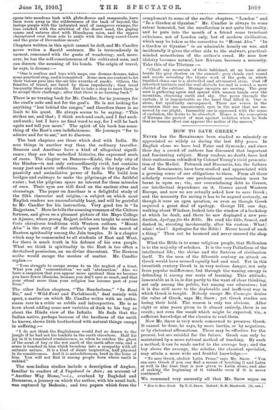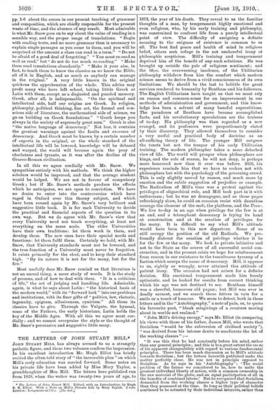HOW TO SAVE GREEK.* NEVER has the Renaissance been studied
so minutely or appreciated so widely as during the last fifty years. In English alone we have bad Pater and Symonds ; and since their day a crowd of authors has discussed that important and fascinating subject. Many readers, no doubt, have had their enthusiasm rekindled by Colonel Young's vivid presenta- tion of the Medici. Petrarch and Boccaccio, too, the fathers of the Renaissance, have been studied and appreciated with a growing sense of our obligations to them. From all these scholarly researches one predominant conclusion must be borne in upon us ; viz., our overwhelming debt to Greece, our intellectual dependence on it. Greece saved Western Europe, and now we are actually asked how to save Greek ; and the necessity for saving it has to be argued seriously, as though it were an open question, or even as though Greek required a great deal of apology. George III. one day, walking about Windsor, looked into the window of a bookshop at which be dealt, and there he saw displayed a new pro-
duction, Apology for the Bible. He read the title, fumed, and dashed in, shouting incoherently, after his custom : What! what! what! Apologise for the Bible! Never heard of such
a thing." Then out he bounced and never entered the shop again.
What the Bible is to some religious people, that Hellenism is to the majority of scholars. It is the very Palladium of the intellectual life ; the shrine and the fortress of civilisation itself. To the men of the fifteenth century an attack on Greek would have seemed equally bad and mad. Yet in this
twentieth century Greek is in very serious danger, not only from popular indifference, but through the waning energy in defending it among our seats of learning. This attitude, lamentable as it is, is due partly to the want of clear thinking, not only among the public, but among our educators ; but it is due still more to the deplorable and inefficient way in which Greek is taught. Nobody except Mr. Carnegie denies
the value of Greek, says Mr. Snow ; yet Greek studies are losing their hold. The reason is only too obvious. After eight or nine years given to it almost entirely, there is no result; not even the result which might be expected, viz., a sufficient knowledge of the classics to read them.
Now Mr. Snow is very much concerned to preserve Greek, It cannot be done, he says, by mere inertia, or by negations, or by rhetorical affirmations. These may be effective for the present, but are suicidal for the future. Greek can only be maintained by a more rational method of teaching. By such a method, it can be made useful to the average boy ; and the boy above the average, the scholar, the classical specialist, may attain a more wide and fruitful knowledge :—
" To save Greek, abolish Latin Prose," says Mr. Snow. "You can save Greek if you can find a means of teaching it and Latin as well in the time that is now given to Latin alone, and also of making the beginning of it valuable oven if it is never continued."
We commend very earnestly all that Mr. Snow urges on
• How to Save Grook, By T. C. Snow. Oxford: B. H. Blackwell. [2s. net.1
pp. 1-6 about the errors in our present teaching of grammar and composition, which are chiefly responsible for the present waste of time, and the absence of any result. Most admirable is what Mr. Snow goes on to say about the value of reading in a sensible way, and the proper usage of translations. "Begin with reading texts, and no more grammar then is necessary to explain single passages as you come to them, and you will be surprised at the amount a class can read in a term." "Do not be afraid of a good deal of forgetting." " You must re-read as well as read," but " do not do too much re-reading." "Make them read translations abundantly." " Make it your aim, in fact, to teach them to know the classics as we know the Bible, all of it in English, and as much as anybody can manage in the criginal." A. very little known in the original quickens the apprehension of the whole. This advice may profit many who have left school, taking litttle Greek or Latin with them, except as a disgusted and puzzled memory. Greek, after all, is indispensable. "On the spiritual and intellectual side, half our origins are Greek, In religion, philosophy, political thinking, fine art, the formal and con- scious side of literature, the mathematical side of science, we go on building on Greek foundations." " Greek keeps you always in the society of supremely great men." Greek is also " the native language of democracy." Not less, it contains the greatest warnings against the faults and excesses of democracy. And Greek must be known by a, certain. number Of experts in the original, or the whole standard of the intellectual life will be lowered, knowledge will be debased and warped, the world will become again the prey of charlatans and tyrants, as it was after the decline of the Graeco-Roman civilisation.
In all this we agree cordially with Mr. Snow. We sympathise entirely with his methods. We think the higher scholars would be improved, and that the average student would be helped. We are not in favour of compulsory Greek ; but if Mr. Snow's methods produce the effects which he anticipates, we are open to conviction. We have no desire to enter into the controversies which have raged in Oxford over this thorny subject, and which have been roused again by Mr. Snow's very brilliant and suggestive little book. It is for each University to decide the practical and financial aspects of the question in its own way. Bet we do agree with Mr. Snow's view that every University need not teach everything, at least not everything on the same scale. The older Universities have their own traditions : let them work in them, and develop them. The new ones have their special needs and functions : let them fulfil them. Certainly we hold, with Mr. Snow, that University standards must not be lowered, and the true function of a University must never be forgotten. It exists primarily for the elect, and to keep their standard high. "By its nature it is not for the many, but for the few."
Most usefully does Mr. Snow remind us that literature is not an unreal thing, a mere study of words. It is the study of persons, and of how to deal with them. "It is a criticism of life," the art of judging and handling life. Admirable, again, is what he says about Latin : " the historical basis of the modern world," with its "forward look " into our problems and institutions, with its finer gifts of " politics, law, rhetoric, ingenuity, epigram, allusiveness, cynicism." All these its classics have to give. Through the Vulgate, the hymnal, some of the Fathers, the early historians, Latin holds the key of the Middle Ages. With all this we agree most cor- dially ; and we cannot overpraise the style or the thought of Mr. Snow's persuasive and suggestive little essay.











































 Previous page
Previous page